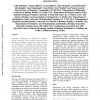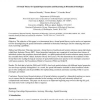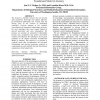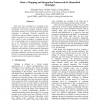124
click to vote
AO
2011
14 years 9 months ago
2011
Biomedical Ontologies are intended to integrate diverse biomedical data to enable intelligent datamining and facilitate translation of basic research into useful clinical knowledg...
105
click to vote
ARTMED
2006
15 years 2 months ago
2006
Objective: The objective of this paper is to demonstrate how a formal spatial theory can be used as an important tool for disambiguating the spatial information embodied in biomed...
121
click to vote
BMCBI
2007
15 years 2 months ago
2007
Background: Current efforts within the biomedical ontology community focus on achieving interoperability between various biomedical ontologies that cover a range of diverse domain...
101
click to vote
KRMED
2004
15 years 3 months ago
2004
The need for a sharable resource that can provide deep anatomical knowledge and support inference for biomedical applications has recently been the driving force in the creation o...
125
click to vote
CBMS
2006
IEEE
15 years 8 months ago
2006
IEEE
More and more ontologies are emerging across bioinformatics domains to represent and define domain knowledge, such as gene ontology, anatomy ontology and disease ontology. To inte...
124
click to vote
SEMWEB
2009
Springer
15 years 8 months ago
2009
Springer
The field of biomedicine has embraced the Semantic Web probably more than any other field. As a result, there is a large number of biomedical ontologies covering overlapping area...
130
click to vote
IWANN
2009
Springer
15 years 8 months ago
2009
Springer
Biomedical ontologies provide a commonly accepted scheme for the characterization of biological concepts that enable knowledge sharing and integration. Updating and maintaining an ...




